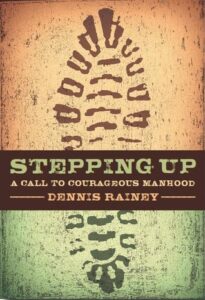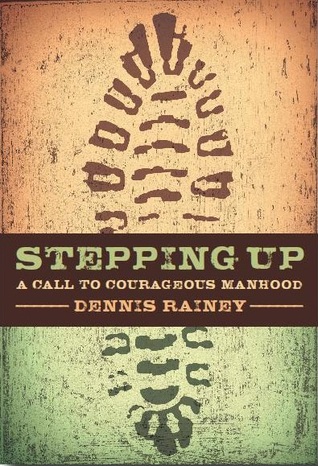Click here to return to Blog Post Intro

Rainey asserts, “There’s a piece of every man’s heart that longs to be courageous, to be bold and gutsy and etch a masculine mark of bravery on the human landscape. In our hearts, we know that a part of the core of true manhood is courage… In order for a man to be courageous, he must know the truth about who God is.”
Author and Pastor Robert Lewis provides the following definition for manhood: “A real man rejects passivity, accepts responsibility, leads courageously, and expects God’s greater reward.” Note that he emphasizes that a real man is active in fulfilling his responsibilities. Initiative is at the heart of manhood. That’s why Rainey talks about “stepping up” as a man.
Alternatively, male passivity is a disease that robs a man of his purpose while it destroys marriages, ruins families, and spoils legacies. A passive man doesn’t engage; he retreats. He neglects personal responsibility. At its core, passivity is cowardice. It’s no coincidence, then, that the greatest predictor of a child dropping out of high school, committing a crime, and going to prison is a growing up without a father. Unfortunately, an increasing number of boys—now a startling 40%—are being raised without their biological dads. This leads to one of the greatest challenges any boy could endure—trying to become a man without a father to show him how.
Winston Churchill is often quoted as saying, “There comes into the life of every man a task for which he and he alone is uniquely suited. What a shame if that moment finds him either unwilling or unprepared for that which would become his finest hour.”
As a father, I have responsibility to build a Godly daughter & sons. For guidance, I turn to Proverbs 4:10–15, which describes a father who protects his son by passing on wisdom, helping him build godly character, and teaching him to reject the lies and temptations of the world. Rainey points out that a man both serves and leads his family. Those two words—serve and lead—may seem like a contradiction, but they are inseparable according to Scripture.
We fathers have increasing responsibilities during the teenage years. What makes the teenage years exponentially perilous is that at the same time your son and his peers are pushing back, you’ll see many fathers beginning to pull out of their sons’ lives. The exhaustion that comes at the end of a pressure-packed workday can result in passivity. Fathers rationalize: the easiest thing to do is disengage. And that is exactly what they do. As a man you must courageously step up and stay involved, wisely moving deeper into your son’s life even as you are pressured to step out of it.
To move through adolescence and learn how to become a man, a son needs his father’s involvement. Sometimes that involvement comes in the form of encouragement; at other times, as a verbal boot in the behind.
When men don’t step up, the cost of doing nothing means that indecency, immorality, and other aberrant behaviors become the norm in the culture. Our children and grandchildren will pay the ultimate price if we turn our heads.
In addition to paying attention to our role as fathers, Rainey argues that men are called to look beyond themselves to the impact they can have on the next generation. He urges more men to become mentors. A mentor passes on his values, including the lessons learned from his mistakes, successes, and defeats. He intentionally passes on wisdom to the next generation and casts a vision for how they can do the same.
Every man needs a mentor, and every man needs to be a mentor. We need another man to speak into our lives, cheer us on, impart the courage to persevere, and make sure we keep stepping up. In turn, we need to mentor others.
As a mentor, you can make a difference in another man’s life that can change his whole world. As someone once said, “To the world, you may just be somebody. But to somebody, you may just be the world.”
Rainey describes a conversation with his mentor, Dr. Wenger, who in his eighties responded to this question, “What’s the most important thing you’ve learned about being a patriarch?” Rainey points out that he’s never forgotten his reply: “That God uses crooked sticks to draw straight lines.” As a man he was aware of his imperfections, brokenness, and need of a Savior. But that didn’t stop him from being used to influence others for Christ.
Are you learning from your mentors? Are you passing along your lessons learned to others? Are you aware of God’s perspective, as you shoot for the stars?


